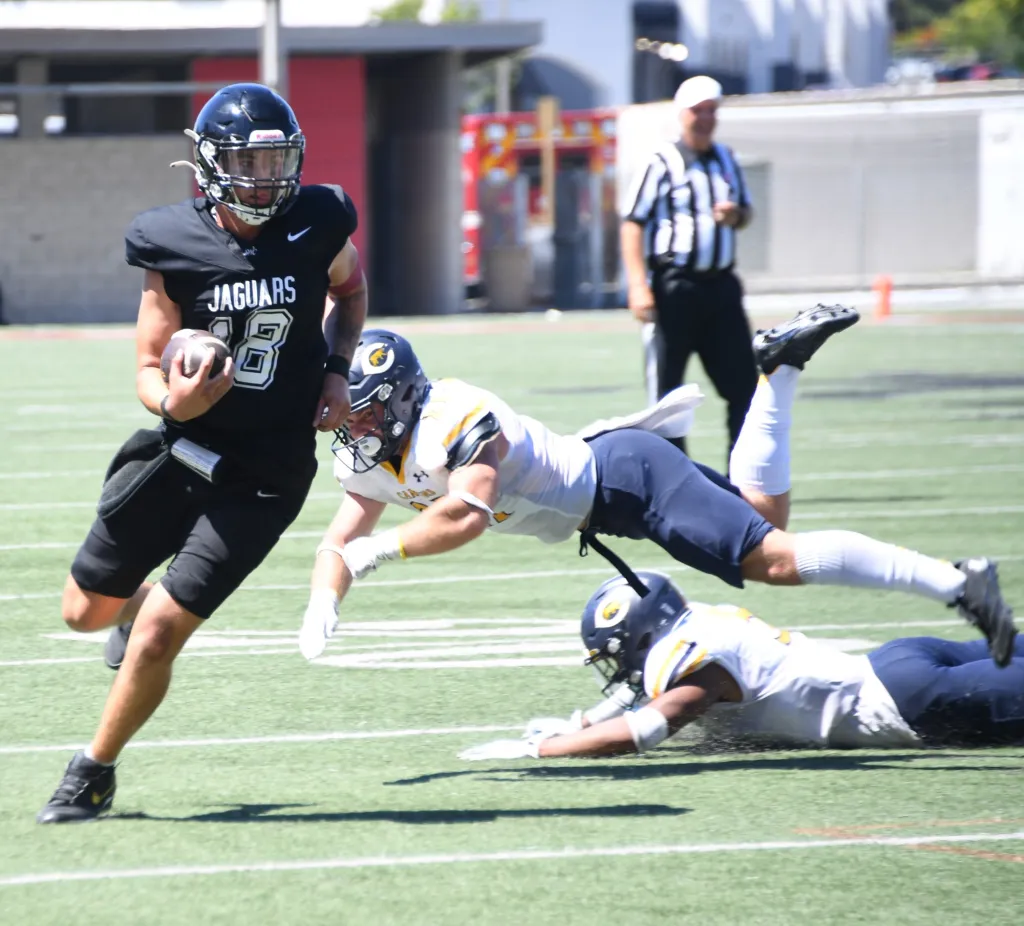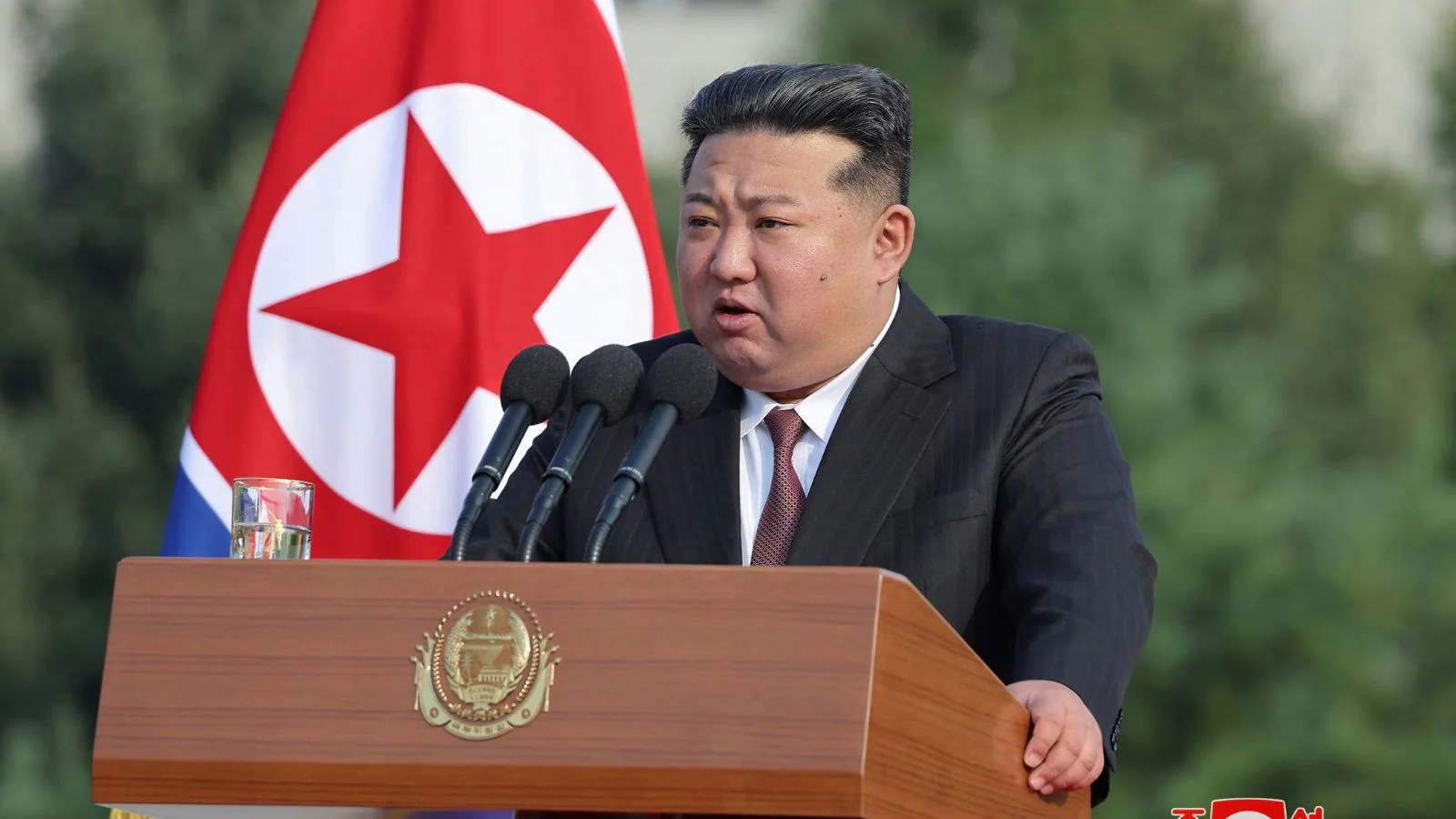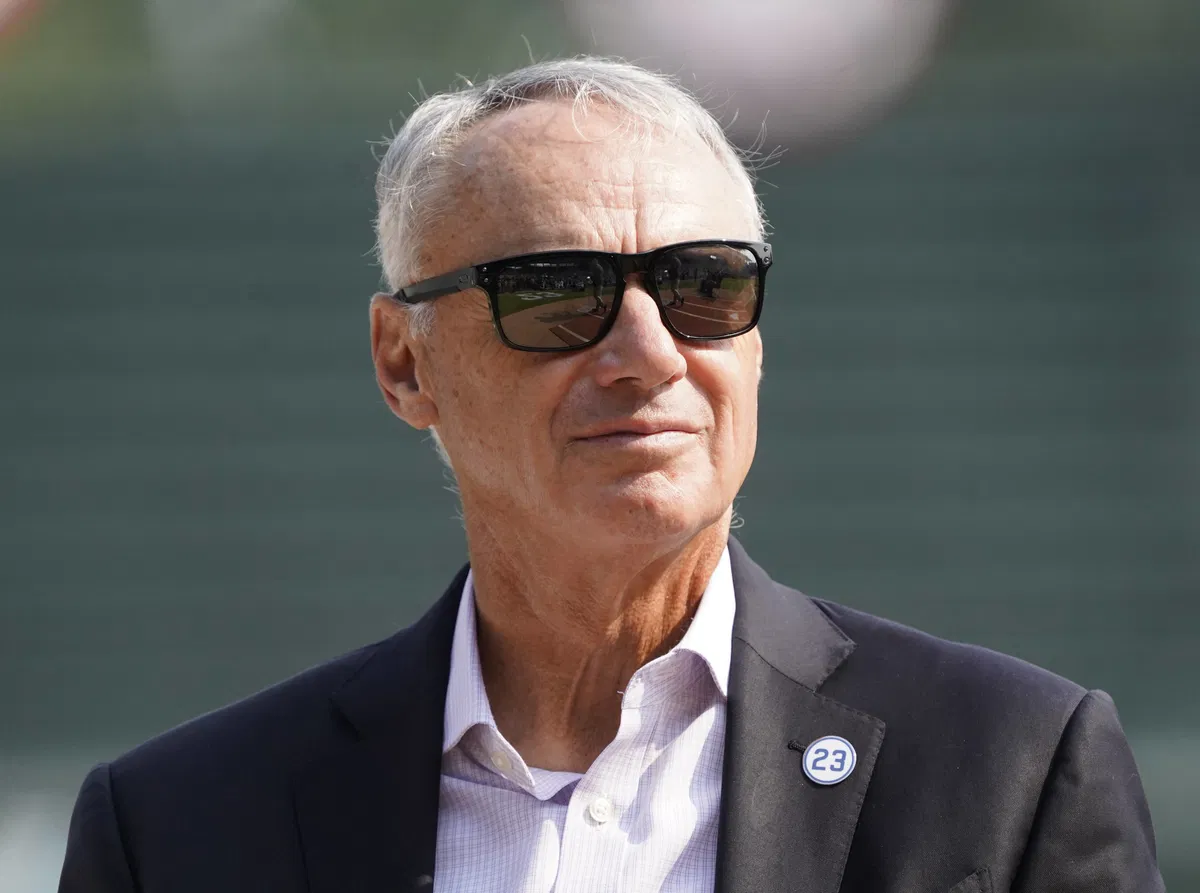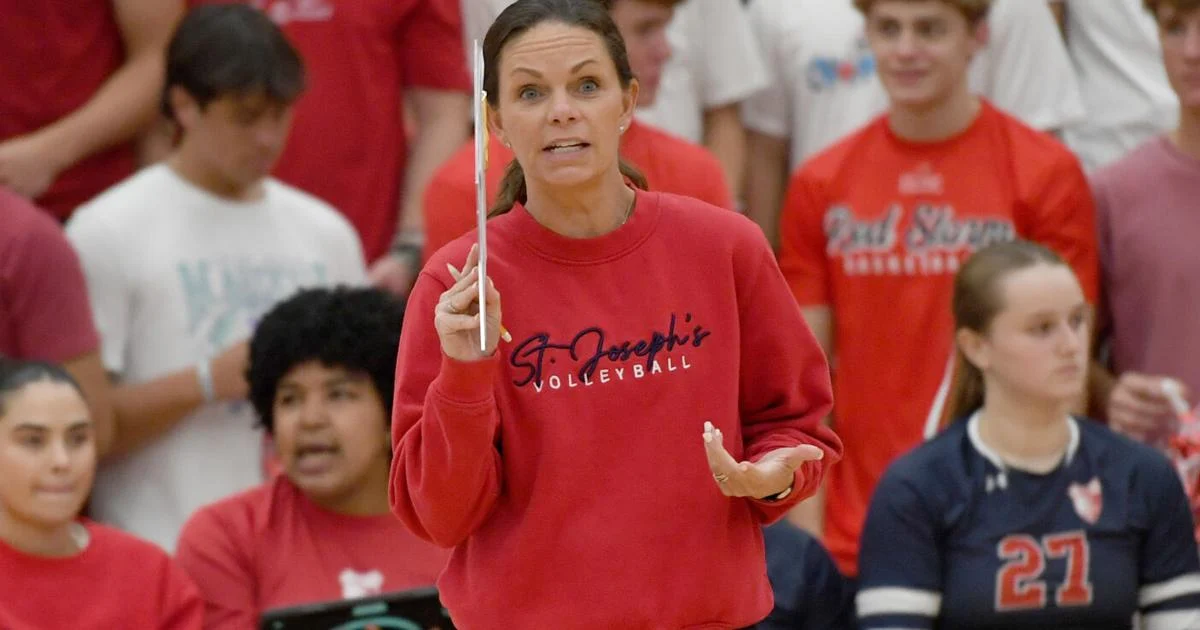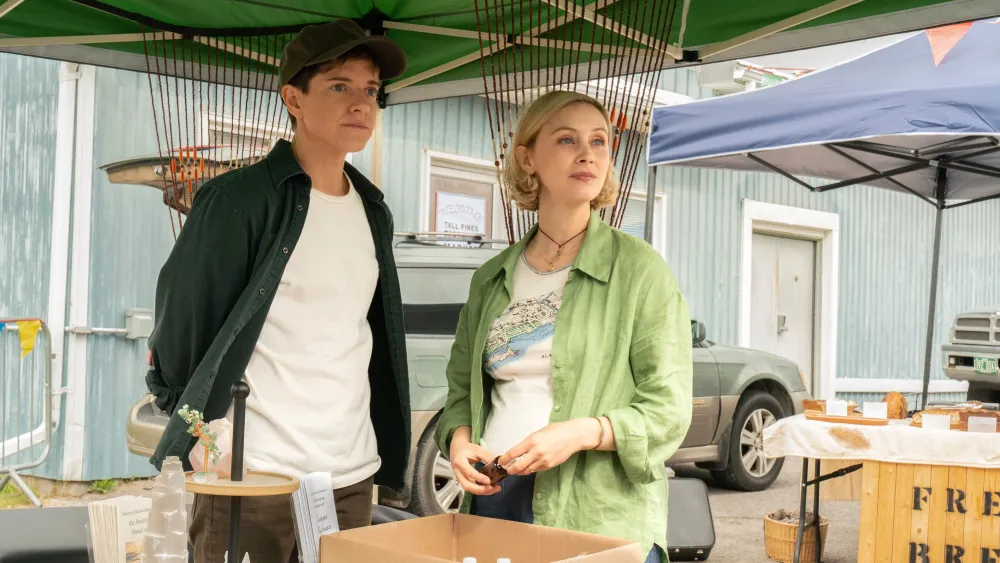
SPOILER ALERT: This story contains spoilers from “Leap,” the final episode of “Wayward,” now streaming on Netflix.
“Wayward,” Netflix’s new mystery series about a nefarious school for troubled teens in Tall Pines, a town filled with shady citizens and dark secrets, has finally premiered. Fans who binge the whole series will definitely be searching for answers after the eighth and final episode ends. Variety discussed the fates of all of the key characters — including new-to-town cop Alex Dempsey (Mae Martin), school leader Evelyn (Toni Collette), Alex’s pregnant wife Laura (Sarah Gadon) and more — and burning questions with the series’ two showrunners, Martin (who also created “Wayward”) and Ryan Scott.
Mae, you’ve been open about your youth and how the series reflects a close friendship you once had. Was making the show therapeutic for you?
Mae Martin: I always feel like making things is not a substitute for therapy. I learned that a long time ago. But it felt like redressing some injustice in a way, to be able to give a voice to that experience. Those themes of adults processing their adolescence come up in a lot of my work, so it was really cool to dive directly into that time period, rather than writing around it.
By the end of the season, Laura has taken Evelyn’s spot in the community. Did you always envision that power shift taking place, even in the earliest drafts?
Martin: We always knew the basic arcs of where we wanted the characters to end up. In sending the scripts to Sarah Gadon, I sent a note saying, “I know Laura, in the first two episodes, is kind of a fantasy, and she’s a bit of a damsel in distress in Episode 1.” I wanted to reassure her that she was going to have this ascension to power by the end.
I think Laura’s my favorite character. She’s pretty interesting and compelling and has a real mid-season shift. As Laura realizes what’s happened to her and that she has had this abuse enacted on her and been drugged and all of these things, it was important to us that she didn’t fall apart or say, “Well, what do we do?” She has a solution, and it’s rising to power and taking Evelyn down. I think that’s satisfying.
Ryan Scott: There’s another component that we were also really excited about in there, which is that all these ideas and belief systems that people create, they don’t die with one person. There’s always another person who comes along that inherits them and adds onto them, and they tumble, whether it be Brigham Young or David Miscavige. These ideas don’t go away. They live in people’s heads, and someone else takes them on, and they become the child of that belief system. So, seeing how families recreate themselves — even within a thing that is trying to get rid of families and the trauma that families can cause, they just recreate it in a different way. And that’s what Laura is; we are recreating these cycles. We can’t escape them in some way.
One of the most interesting visuals was the crosscutting between Laura’s birth and Evelyn’s drug trip. It felt like they were tied together physically. Do you think there is some sort of mystical, physical connection there? Or were you hoping to just show parallels through editing and camerawork?
Scott: I think both. We discovered that a little bit in editing, how much we could throttle it up. And then some of it was we knew that we were playing with cycles, and we knew that Evelyn’s death was Laura’s birth. The thematic connections between those two were really powerful, the connection between life and death. It just seemed like to twin those stories and to twin the decline and the ascension seemed too easy not to play a power chord.
Martin: It’s a transition for both of them, and such a major transition point in looking at intergenerational trauma and seeing this next generation being born. Even the echo of “In the Pines,” of Laura using that song. When we shot it, just the imagery, it was so unsettling. Having all the naked people in the room and the baby, a real baby — I think it turned out really well.
The show begins and ends with Pink Floyd’s “Time.” Why was that song so central to the story?
Martin: It was in the original pilot script, because I’m a deep Floyd fan. Right around puberty, I went to see “Dark Side of Oz,” where they show “The Wizard of Oz” with “Dark Side of the Moon.” It was so beautiful, and the whole album is really a hero’s journey. It’s a concept album that takes you from the birth to the death of a person. Pink Floyd is the soundtrack to my teens, and also for Abbie [Sydney Topliffe] and Leile [Alyvia Alyn Lind], who really mythologized and are obsessed with ’60s culture and the culture of their parents, and feel so let down by their parents’ generation, who abandoned those ideals. I think that was important to show that they’re out of place in the early 2000s, these hippie kids, and that’s what I was like.
I wrote a letter to Roger Waters and a letter to David Gilmour, and I can’t believe we got it. It’s really cool that it bookends the series, and also halfway through, we have Duck [Joshua Close] singing and playing it on the guitar. The lyrics are just about that deadening of spirit as you transition into adulthood, that hanging on in quiet desperation is the English way. It’s so good.
The skin-to-skin scene at the end is so scary and strange. How did it gestate in your mind?
Scott: I’m not sure. I think it came for me because I’ve got two kids, and one of them was born in the middle of the night after a very long labor. It was a strenuous thing. I remember that skin-to-skin moment and how bizarre and strange and connecting and visceral and messy it was. It’s a thing that people don’t see a lot, and it’s very intimate when that happens and it’s your first moment of connecting. It’s the beginning of the story of your life with this person and of that connection. I thought it would be particularly interesting in this show, given Mae’s character. All of a sudden, you’re like, “How does everyone connect to this in this world where this is the first kid? What if they all started taking off their clothes?” That was our moment at the end of “Rosemary’s Baby” where there’s a little hand that comes out. It seemed like a really beautiful but eerie, progressive, messy way of telling a story of how perverted it would be if that were the case.
Martin: For Alex, who’s so yearning for this heteronormative nuclear family and to be the guy for this baby — to have that moment ripped away from him and, in that moment, have it dawn on Alex that this is not going to be what he thought it was. I think it’s such a jarring image and so deeply icky that he instantly knows he’s made a huge mistake. He’s so desperate for all those rites of passage of fatherhood and all the moments, but he doesn’t get to cut the umbilical cord and things like that. So tragic.
Would you want to do a second season or do you want to leave the ending how it is?
Martin: I’ve been doing so much press and I’m so interested in people’s reactions to the ending. It seems like people have an appetite for more, but also it’s so funny that people are like, “Well, it’s really ambiguous with Alex.” I’m like, “I don’t know if it’s ambiguous — maybe he just didn’t make the choice that you wanted him to make.” Some of the characters make disappointing and very human choices. I think, hopefully, it works as a mini-series, but then it’s also obviously fun to imagine what would happen. But I feel like the FBI would be in there pretty fast. There are so many dead people now.
Scott: There’s a lot of dead people. There are a lot of things at the bottom of that pond to find. I’m so excited to see what people think, but I mean, there’s a part of this that’s a tragedy and it does feel a little unresolved in a sense, but mostly also resolved. I think Dempsey makes a very clear decision. It’s a decision that a lot of us make that comes with adulthood, which is that we’re not always willing to risk blowing up our little lives to do what’s right. And sometimes that’s what adulthood feels like. I don’t want that to be the case, but it sometimes is. But there are different resolutions for other characters outside of Dempsey that paint the image of the whole human experience, of how we are all different people. Some people are like Abbie and can really hold on to themselves and be empowered by this and make it. Some people just don’t. That’s like having the panoply of responses and not just one path for dealing with your trauma. That is really important: There’s not just one right way to do everything.
Do we meet Evelyn’s child during the series, and we might just not know who it is?
Martin: I think we leave it up to interpretation.
Do you think Dwayne (Brandon Jay McLaren) ever liked Alex, or was it all just a front?
Martin: All a front. Maybe for a second he would entertain that this could be a new friendship, but I think he was a pretty territorial guy and it was always a front.
Do you think that Alex 100% killed Dwayne or is there a chance he’s alive?
Scott: He did. I mean, he got smashed in the head with a rock! That guy’s dead.
Why do you think Rabbit (Tattiawna Jones) drugged Evelyn at the end to let Alex escape?
Scott: Maybe there’s a sense of justice still inside of Rabbit, both for these kids and for herself. Just seeing Evelyn’s abuse of power, she couldn’t take it anymore.
Martin: I think she really is burned by not being able to take Stacey [Isolde Ardies] under her wing. So the veil is slowly slipping, and her love for Laura. But then, Evelyn’s mask slips so completely in that basement when she slaps Alex and the things that she’s saying to him. I think even though Rabbit’s deeply attached to her abuser, there’s some flickering sense of justice inside.
Scott: And she cares for Evelyn as she’s dying, immediately pivots into it, which is often how family dynamics work — being the injurer and then the caregiver right afterwards. So it was very much a non-familial family dynamic.
Is Evelyn definitely dead?
Martin: I don’t think so. I think she’s a vegetable and, yeah, I’d be curious to see if she could ever come out of it, but she’s definitely a vegetable.
What was your interpretation of Evelyn’s vision with the doors in her mouth?
Martin: Hopefully, that’s a memorable image that stays with people. It’s all about cycles and generations and looking internally. What she’s expecting to be on the other side of that door is total freedom and relief and euphoria. Of course, she’s just trapped in a sort of purgatorial hell of loneliness when you sever all attachment.
Scott: It’s definitely reaching within yourself and pulling out your true self and the uncanny experience of self-discovery, which is weird that a person can be hiding inside of yourself. Your true self is inside yourself, hiding somewhere. That’s a weird thing to visualize. Then there’s this weird other, like Mae got really into parables. We really got into the myth. There’s one myth about how a mother is like a crocodile with its mouth open and all of its babies are inside of it and swimming around. They’re both protector and the most dangerous person in your life. So there was this image of mouths and reptiles and frogs and it came up in the brew and cauldron of our room.
Martin: There’s also a short story by H.G. Wells called “The Green Door” about a guy who loses track of this magical place that he can access as a child. As he gets older, he can’t find that door again. But it’s all a swampy thing that birthed this.
Is Abbie going to make it?
Martin: Yeah, she’s going to be Prime Minister of Canada, I hope.
Scott: I think when Evelyn says what her future is going to be there, I think she’s kind of right that Abbie’s going to be okay. I think that was a correct read of Abbie in that situation, maybe. Whether it’s right to tell that to a kid or not is different.
This interview has been edited and condensed.
Watch the “Wayward” trailer below.
